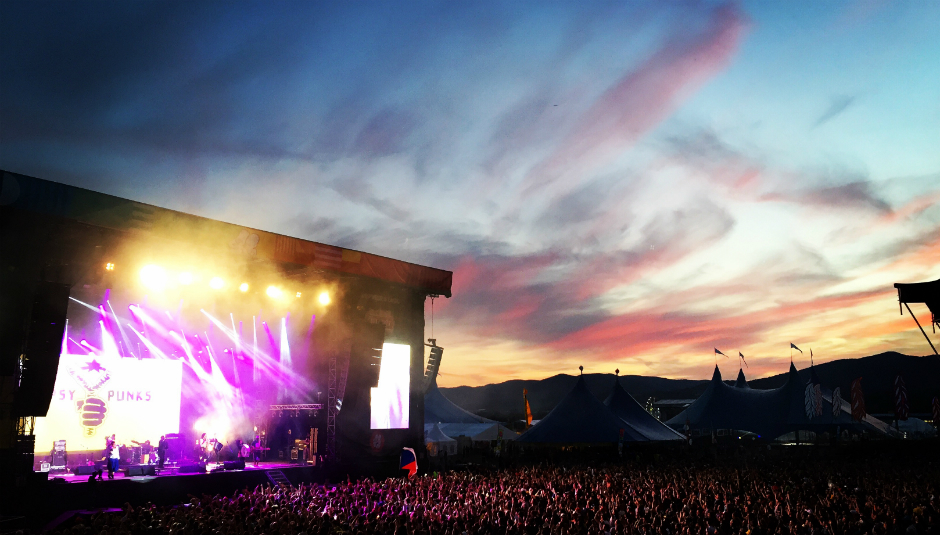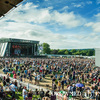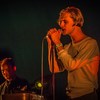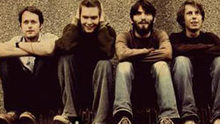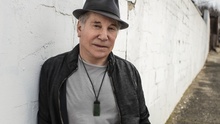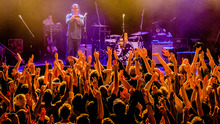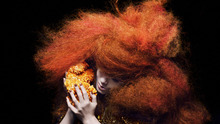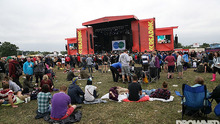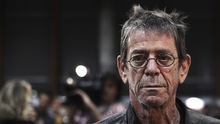From the very first note, Ivan Kozolka can’t help himself. He knows. What starts as a gentle bobbing becomes more and more demented; limbs flailing, jerking from side to side, he’s like a hyperactive child who’s overdosed on Haribo, a manic grin plastered across his face. Pretty soon, the band notices him too – not hard, given he’s about 6’4” and wearing a stars and stripes bandana folded into a headband – and invite him on stage. To raucous cheers, he dances about at the front, hits a cymbal a few times, and even manages a few sly notes on the keyboard. After high-fiving the bass player, his flip-flops are deemed surplus to requirements, and tossed into the crowd; when you’re having this much fun, who needs footwear? Clambering back into the crowd at the end of the song, he’s greeted like a returning war hero; backs are slapped and beers are downed. He looks elated. I’m grinning too, because I’ve just fallen in love with Slovakia’s Pohoda Festival.
Despite it being only 2pm and about 29 degrees, Finnish garage rockers Have You Ever Seen The Jane Fonda Aerobic VHS? have drawn a sizable, not to mention excitable, crowd. Their recordings may have a shambolic charm, all the edges fuzzed out with loose playing and distortion, but live they’re whip smart and super tight, fizzing through their set with a precision that belies their slacker appearance. It’s one of the best things I witness all weekend, and the type of discovery that makes this festival so special; relative unknowns punching way above their weight and winning you over, a description you could apply to Pohoda as whole.
But that’s exactly the mentality the festival is trying to change, and rightly so. Now in its 20th year, the grounds around Trenčín Airport have hosted such luminaries as Nick Cave, Lou Reed, Pixies, and Kraftwerk, and it’s grown from just 140 attendees in 1997 to 30,000 per day. The organization is superb, and at €99 for a three-day pass – not to mention multiple low-cost options to get to both Vienna and Bratislava airports – it’s a wonder it hasn’t become as renowned among Western music fans as Exit or Sziget. Wandering the site, bathed in glorious, early July sunshine, my mind wanders back to those images of this year’s Glasto mud bath; why wouldn’t anyone prefer this?
Nobody Does It Better
It bears repeating that continental events continue to operate on a level that seems beyond what UK promoters and festivals can offer. Perhaps it’s the commitment to the experience being placed above profit, or maybe UK audiences just generally don’t care that much about being fleeced and offered sub-standard fare and treatment. I talk to a few fellow Brits, and we snigger at overpriced, lukewarm lager in plastic cups, tasteless, uninspiring food, and the news that an entire cash machine was stolen at T In The Park; compared to that, this is Utopia. The food options alone are mind boggling; whole roast chickens for €4.50, barbequed corn-on-the-cob and local sausages, inventive noodle dishes, industrial sized slices of fresh pizza, dripping with cheese, salami, and vegetables, and a never ending selection of national specialties consisting of various stews, soups, and lashings of dumplings. There’s even a fruit stand, selling whole melons, apples, peaches, and a vast range of berries. All of it is ridiculously cheap, and served with genuine warmth and a smile; it’s also heartening to see virtually no litter the whole weekend – everyone carefully sorts their rubbish into the correct recycling bins, of which there are thousands dotted across the site.
There’s also remarkably little drunken shenanigans, despite the enormous quantities of local lager - and pints of wine at one stall – being poured and consumed at every bar we pass. In fact, it’s one of the most well-behaved festival crowds I’ve ever witnessed; even mosh pits and crowd-surfing are handled in an orderly, dignified manner, especially by security and the army of hi-vis jacketed volunteers who, in between dancing to the music and handing out free water to those at the front, seem to having as much fun as anyone. Maybe there’s something to the theory about treating festival-goers as valued, paying customers as opposed to an irritation fostering mutual respect, understanding, and good behaviour; not only are there tankers of drinking water constantly driving round the site, but several stations dispensing free, Factor 30 sunscreen to anyone in need.
Past Glories vs. Reputation
The actual music is a curious mix. I’m told that the organisers go with their gut instinct, and don’t pay too much attention to who’s hot or not, or who has an album to promote; reading through the line-up, that certainly rings true. Thursday is a quiet night, comparatively – only the main stage is used – but the two acts scheduled, Gogol Bordello and PJ Harvey, are stylistically about as opposite as you can get. “One of the ultimate festival bands”, quips a colleague sat watching the former run through their madcap, Gypsy-punk shtick, and they certainly get the crowd going. But if you’ve seen them before, the antics wear a little thin; shirtless, guitar slung across his back, and careening across the stage as if he’d been plugged into the mains, Eugene Hütz looks like the demented offspring of Frank Zappa, the contents of a bottle of red wine being variously thrown around, drunk, and poured everywhere but into a glass. Fifteen years is a long time to be peddling the same trick, and it’s a little disappointing the band doesn't have more variety at their disposal.
Polly Jean is, as you would expect, considerably more stately, but no less captivating. The last time I saw her headlining, at Primavera Sound in 2011, she had just a harpsichord and John Parish for company as she attempted to recreate the vivid imagery and haunting melancholy of Let England Shake; needless to say, it fell a little flat. But tonight she’s brought a full band – including long time collaborator Mick Harvey and legendary saxophonist Terry Edwards – and the fuller, more rounded sound doesn’t just suit material drawn from this year’s The Hope Six Demolition Project; the likes of ‘This Glorious Land’ and ‘The Words That Maketh Murder’ sound, well, glorious. A few old classics add to the sense of an artist playing to the gallery a little more, and reaping the rewards; she’s given such a drawn-out ovation that an encore becomes obligatory.
The other band given top billing doesn't appear till Saturday, and are an odd choice given the diminishing returns of their output since the heady days of 1997’s Fat Of The Land. The Prodigy will always have the songs of course, but as a touring “Greatest Hits” act, it’s a little sad to see Keith Flint looking a little pudgier, and less enthusiastic, each passing year. No-one cares about this though, as everyone is too busy – and when I say everyone, I mean almost the entire festival, such is the sea of people in front of the main stage – going crazy to ‘Breathe’, ‘Voodoo People’, and ‘Smack My Bitch Up’. They even have the balls to relegate ‘Firestarter’ to early in the set, stretching and bending it out of shape, without anyone caring too much. I guess it’s inevitable during long weekends such as these that spectacle, at some point, has to trump artistry, but then some of us remember when bands like The Prodigy used to stand for something significantly more important than million-watt light shows and endlessly re-hashing better days.
Brexit
There is, of course, one inescapable topic that looms large in everyone’s conversations, whether fan, staff, or artist; more than once, and by various nationalities, I’m basically asked: “Dude…what the fuck happened?” “We’re Eagulls, from post-Brexit Britain”, deadpans the Leeds quintet’s frontman George Mitchell to muted cheers, and the slow-burn darkness of their new material sounds tailor-made for uncertain times, and a country slowly imploding. Even the blistering sunshine fails to disguise their gloomy magnificence, their hour-long set passing by all too quickly. I run into them later, backstage, and like many, they’re still incredulous. “The thing is, who voted for this shit?” asks bassist Tom Kelly. “We don’t know anyone who did.”
“I feel like I have to apologise for my fellow countrymen, but we voted to stay!” says Scot Anna Meredith to a packed tent. “It’s ironic we’re on the Európa Stage…but it’s terrible, and I’m sorry.” She’s halfway through what she claims is, at an hour and a half, “our longest set ever”, but you’d never guess; with just four others to call on, she effortless creates all the swooping dramatics and brass fanfares of this year’s stunning Varmints. “Overwhelming” is how she once described her desire to have her music take people over physically, and short of dragging a custom sound system around, she gets pretty damn close; the virtuosity on display and level of detail, not to mention the ability to crank through the gears and the volume, is highly impressive. We even get a stripped down, pared back cover of Erasure’s ‘A Little Respect’ – one of her favourite songs apparently – that stays just the right side of weird.
Savages refrain from such direct comment, but then it’s not really required; there’s plenty of indignation and righteous fury wrapped up in their music. Dressed all in black despite the heat and the hour – Jehnny Beth looking particular uncompromising in a razor sharp suit and vicious looking heels – they stalk the stage, their bold, taut songs positively fizzing with menace. ‘Sad Person’, ‘The Answer’, and ‘Slowing Down The World’ scan like manifestos; for change, for hope, for better. "This is for you if you've had a bad day, a bad week or a bad fucking year,” says Beth, introducing closer ‘Fuckers’ – a pointed and perfectly apt note on which to end. “Don’t let the fuckers get you down” spits Beth repeatedly, a mantra for anyone casting an eye over the perilous state of the world and clinging to the last strand of optimism. The hour they gift us proves that Savages are precisely the type of band that’s needed right now; uncompromising, passionate, and a bulwark against the cascade of dark and depressing news we now face on an almost daily basis.
The State Of Modern Indie
The temptation for a festival to book numerous semi-talented, semi-known indie bands – whether from the past or not – to pad out the schedule must be high; how else to explain someone like The Kaiser Chiefs appearing suspiciously close to the top of too many bills this summer? Pohoda, to their credit, have not followed suit – there’s no landfill indie to be found here. Furthermore, the Slovaks appear to be a discerning, knowledgeable crowd judging by the rapturous reception afforded some of the weekends' more cultured acts.
Poliça draw a huge crowd to the X tent, the somewhat cleaner, poppier tracks from this year’s United Crushers sitting neatly alongside their more personal, claustrophobic early work. Having two drummers certainly lends everything a muscular quality that’s not apparent from the records, but while the rhythm section keeps the groove rolling along, it’s Channy Leaneagh’s voice that’s the star. Whether unfiltered, or distorted and effect-laden, it seems to float above everything else, by turns ghostly and ethereal, or piercingly crystal clear.
Scottish duo Honeyblood are another band allotted an early afternoon slot in the blazing sun on the Budiš stage; as hard as it must be for groups to fill this space, two people look positively lost in the wide open sea of black. Stina Tweeddale and Cat Myers don’t let it bother them though, and crack through a roaring set of songs drawn from their self-titled debut and the upcoming Babes Never Die. The acid test of any festival performance is how quickly a band can get the crowd onside; by the third song, the first few rows are dancing merrily away – Ivan included – and another extended ovation means the band are forced to come out and play one last song. “This is a brand new one, but we haven’t rehearsed this at all, so excuse us if it’s shit,” says Tweeddale somewhat sheepishly, but the apology isn’t required; like everything else, it’s great, exactly the sort of rackety, scuzzy indie-pop that’s given them such a stellar reputation.
The Vaccines are the one band that arrive with a reputation bigger than their recorded output perhaps deserves; a few people I speak to seem genuinely enthusiastic about seeing Justin Hayward-Young & co. rattle through their four-chord, pub-singalong-indie in the flesh, while a few others plan on being as far away from it as possible. They certainly attack their set with gusto, guitarist Freddie Cowan seeming particularly enthused as he struts about the stage, but there’s a bland, flat quality to their music that no amount of preening or showmanship can disguise. During ‘Post Break-Up Sex’ – ironically, one of the cheerier, better moments – Hayward-Young sinks to his knees at the front of the stage, and it’s hard to tell whether this is for effect or out of sheer boredom. As a frontman, he’s something of a charisma vacuum, and as their songs – and his vocals – drift off into the afternoon haze, we notice a few others doing exactly the same.
“Consistently intriguing, adventurous music” is one way of describing what Roísín Murphy has been up to these last few years. “Complex pop”, as she herself put it recently, is another. There’s a good deal of expectation as she strolls onto the mainstage, and she certainly lives up to those adjectives; what we get is anything but dull. From ‘Mastermind’ through ‘Ancora Tu’ to ‘Exploitation’ – complete, of course, with a teasing snippet of ‘Sing It Back’ – she’s a captivating presence, helped by the many and varied wardrobe changes she undertakes; some of them even occurring mid-song. “I want to build a tower, right here, one that’s ten miles high. And I’d call it Murphy Towers!” she exclaims enthusiastically before launching into, yup, ‘Ten Miles High’. A suspicion remains that she’s being helped along by some early afternoon visits to the refreshment tent, but the unpredictable air merely adds to the spectacle of a left-field pop icon carving out her own niche.
It falls to James Blake, on the Orange Stage, to act as a sort of Elder Statesman and deliver a set befitting his reputation; he is, quite simply, epically brilliant. Too often at past festivals, playing solo, his chilly melancholy has drifted off into the night, lost and untethered. But now, beefed up with a drummer and someone else on keys and guitar, his sound is nothing short of magnificent; the slow, glacial pace of everything wraps itself round your brain, his choirboy vocals piercing the gloom with sad refrains. Of course, we get ‘The Wilhelm Scream’ and ‘Lindisfarne I’ & ‘II’, and while the biggest cheer – and singalong – is saved for ‘Limit To Your Love’, tracks from The Colour In Anything show what a sublime vocalist and producer he’s become. “Where you lead me, I will go” he sings over plaintive piano on ‘Love Me In Whatever Way’; following such a spellbinding 90 minutes, it’s a refrain easily reflected back.
Adventure Rewards The Brave
As with any festival, part of the appeal comes from simply wandering around the grounds, following your eyes and ears. There’s so much crammed into the three days, and not just musical escapades either; there are poetry readings, craft workshops, and political discussions, although most of them are in Slovak. A “sports zone” is located next to the Budiš stage, although it’s a little disappointing; there are a couple of small Ferris wheels, a tightrope challenge over a shallow pool, and, most intriguingly, a bubble football pitch (although the queue for this never drops below lengthy). I also happen upon a converted double decker bus, the top of which has been converted into a stage and is mostly occupied by Bazzookas, a ska-funk jam band who succeed in getting the modest crowds gathered on the grass bouncing around with gleeful abandon.
A curious space is the Visegrad Club, basically a blacked out wooden hut that hosts all manner of DJ’s and experimental music from the early hours of the afternoon to the early hours of the morning. I stick my head in several times to see what’s going on, most intriguingly catching Domen Učakar late on Saturday afternoon. The Slovenian, who performs as Lifecutter, deals in a dark, twisted take on experimental drone-techno; it’s extremely loud, intense, and when he employs some glitch and rumbling sub-bass, deeply unsettling. Wandering in from the blazing hot sun to this, in a dark, sweaty box, is quite disconcerting, made even more so by the fact that the sizeable crowd are actually sitting, listening politely and sipping on drinks. Someone has even brought their dog, which gambols around being patted and petted by all and sundry.
One of the most intensely attended sets I witness all weekend is not really a set at all, rather a mass traditional Slovakian dance-along set to disco gypsy music. With people spilling out onto the grass all around the absolutely rammed NAY Tanečný Dom tent, two instructors on stage – one woman, one man – run through a variety of moves that look suspiciously close to line-dancing, while everyone else attempts to copy them. It’s a beguiling sight watching several thousand people move back and forth and side to side in unison, doing various kicks, steps and twirls in perfect time; clearly, many are experienced practitioners. It goes on for about an hour, a smile plastered on the face not just everyone participating, but anyone who stops by to watch, a sweet moment of communal joy among the madness.
But Band of the Festival, and authors of one the most enthralling, confrontational sets you’re ever like to see, are Ho99o9. They don’t just blow everyone else away; they unleash a hurricane of noise and madness that scoops up everyone in earshot and dumps them down, 40 minutes later, battered, bruised, but manically grinning from ear to ear. They were electric at last year’s Le Guess Who? Festival, but now they’re positively filthy, a live drummer – who absolutely hammers his kit into submission – adding some beef and drive to the swirls of samples and loops. There’s stage diving, a moshpit, bottles of wine being passed around, and someone from their entourage stalking around in a jumpsuit and balaclava, filming it all on an old-school Sony Handycam.
Their snarling, screaming punk-rap / hardcore industrial hip-hop hybrid is part theatre, part rock opera; angry music for angry times. It seeks to take on the world on its own terms, each blistering song a chaos of aggression and venom that violently carves out a place for itself, whether anyone wants it or not. This is music not just for the downtrodden and disenfranchised, it’s a breath of fresh air for anyone dissatisfied with the mess we currently find ourselves in. “You can't sugar-coat the world we live in today, it's all around us whether you acknowledge it or not…It’s real life punching you in the fucking face,” said Eaddy about their fascination with gore and violence in a recent interview, and it’s hard to argue; they take the treatment meted out to them – to everyone – and flip it around in their art. Kudos to Pohoda then, in giving something as uncompromising as this just as much prominence and respect as those who very obviously “play the game”, and for trusting their audience to follow suit.
Pohoda Festival 2017 will take place from the 6th to the 8th of July. For more information, go to the festival's Official Website.

